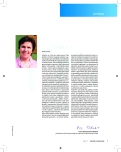-
Medical journals
- Career
Seniors’ Perceptions of Healthy Lifestyle: Compa-rative Qualitative Study
Authors: Z. Chytková; M. Kunderová; B. Jurašková 1; M. Karlíček
Authors‘ workplace: Katedra marketingu, Fakulta podnikohospodářská, Vysoká škola ekonomická, Praha ; KLINIKA GERONTOLOGICKÁ A METABOLICKÁ LF UK A FN HRADEC KRÁLOVÉ 1
Published in: Geriatrie a Gerontologie 2012, 1, č. 1: 14-19
Category: Original Article/Study
Overview
Seniors’ Perceptions of Healthy Lifestyle:
Comparative Qualitative Study. Lifestyle has an important impact on the quality of life of the elderly. However, this field has not been adequately analyzed yet. This qualitative study therefore tries to uncover how Czech elderly perceive healthy lifestyle. This question is studied in comparison with two contrasting demographic groups, college students and working adults. The students perceived healthy lifestyle primarily as a limitation in taste and time. The working adults saw healthy lifestyle as a question of equilibrium. The behavior of the elderly was significantly influenced by their life-long experience and was changed only in sight of health problems. Based on our results, we suggest changes in the way healthy lifestyle is generally communicated.Key words:
healthy lifestyle – eating habits of seniors – lifestyle change
Sources
1. World Health Organization, Global Database on BMI (on-line). 2011,(cit 2011-08-03). Dostupné na: https://apps.who.int/infobase/CountryProfiles.aspx
2. Marshal, T. A. et al.: Inadequate Nutrient Intakes Are Common and Are Associated with Low Diet Variety in Rural, Community-Dwelling Elderly.J Nutr 2001; 131(May): 2192–2196.
3. McKie, L. et al.: The food consumption patterns and perceptions of dietary advice of older people. J Hu Nutr Diet 2000; 13(3): 173–183.
4. Trichopoulou, A. et al.: Modified Mediterranean diet and survival: EPIC – elderly prospective cohort study. BMJ 2005; 330(7498): 991.
5. Agnoli, C. et al.: A priori-defined dietary patterns are associated with reduced risk of stroke in a large italian cohort. J Nutr 2011; 141(8): 1552–1558.
6. Huijbregts, P. et al.: Int J Epidemiol; 1995; 24(2): 131–320.
7. Wengreen, H. J. et al.: Diet Quality Is Associated with Better Cognitive Test Performance among Aging. J Nutr 2009; 139(10): 1944–1949.
8. Bailey, R. L. et al.: A dietary screening questionnaire identifies dietary patterns in older adults. J Nutr 2007; 137(2): 421–6.
9. Chrysochou, P. et al.: Social discourses of healthy eating. A market segmentation approach. Appetite 2010; 55(2): 288–97.
10. Devine, C.: Life-Course Influences on Fruit and Vegetable Trajectories: Qualitative Analysis of Food Choices. J Nutr Edu 1998; 30(6): 361–370.
11. Edstrom, K., Devine, C.: Consistency in Women’s Orientations to Food and Nutrition in Midlife and Older Age: A 10-Year Qualitative Follow-up.J Nutr Edu 2001; 33(4): 215–223.
12. Holý, L.: Malý český člověk a skvělý český národ. 2. vyd. Praha: Slon 2010.
13. Jamrozik, K. et al.: Predictors of death and vascular events in the elderly: the Perth Community Stroke Study. Stroke 2000; 31(4): 863–8.
Labels
Geriatrics General practitioner for adults Orthopaedic prosthetics
Article was published inGeriatrics and Gerontology

2012 Issue 1-
All articles in this issue
- Possibility of osteoporosis screening using ortopantomographic radiographs
- Assessment of educational need at women in osteoporosis prevention
- Seniors’ Perceptions of Healthy Lifestyle: Compa-rative Qualitative Study
- Determination of subjective changes in swallowing of elderly patients
- Social relationships in old age
- Principles of nutrition in geriatric patients in palliative cancer care programme
- Psychiatric assessment in older age
- When does the palliative care of a CVA patient begin?
- Aspects of compliance
- Legal liability for damage, caused to patient in health care facility, according to civil law
- Geriatrics and Gerontology
- Journal archive
- Current issue
- Online only
- About the journal
Most read in this issue- Legal liability for damage, caused to patient in health care facility, according to civil law
- Psychiatric assessment in older age
- Social relationships in old age
- Determination of subjective changes in swallowing of elderly patients
Login#ADS_BOTTOM_SCRIPTS#Forgotten passwordEnter the email address that you registered with. We will send you instructions on how to set a new password.
- Career

